Crack in US-Israel alliance for first time in decades
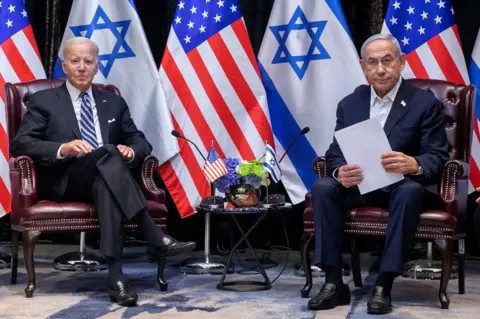 EPA
EPAPresident Joe Biden upended part of one of the world’s most significant strategic relationships this week.
It happened in a TV interview, when Mr Biden was asked what would happen if Israel went ahead with a planned invasion of Rafah. “I’m not supplying the weapons,” he replied.
Arms shipments are the bedrock of the US-Israel alliance. For the first time in four decades, a crack appeared.
Mr Biden has been under sustained pressure at home and abroad to help prevent further major civilian casualties and a worsening humanitarian crisis in Gaza.
He finally crossed the threshold of withholding arms shipments to Israel, American’s closest strategic ally in the region - a move not seen since President Ronald Reagan in the 1980s.
Since the start of the war, Mr Biden has been caught in a political divide between an unquestioningly pro-Israel Republican party, and his own deeply divided Democratic Party, says Aaron David Miller, a former State Department analyst and veteran Middle East peace negotiator.
Until now, the president has appeared reluctant to do anything seen to damage the US-Israel relationship, Mr Miller says.
What changed was Mr Biden’s view that the Israelis were close to a decision to invade Rafah.
On Monday, Israel said its ground forces were starting "targeted activity" in the east of the city, with Israeli tanks said to be massed close to built-up areas. Residents reported the constant sound of shelling and said barely functioning hospitals were overwhelmed with the wounded.
The UN says more than 100,000 people have fled the fighting, and are facing dire shortages of shelter, food, water and sanitation services.
Prime Minister Benjamin Netanyahu has repeatedly vowed to launch a full ground invasion of the city, home to more than a million displaced Palestinians. He says a major operation is required to destroy four remaining Hamas battalions hiding there, and will be carried out regardless of whether any ceasefire talks succeed.
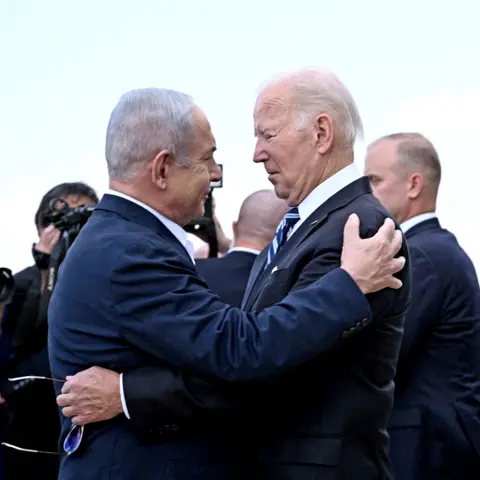 AFP
AFPWashington has repeatedly urged him not to, pressing for a more “targeted operation” in Rafah against Hamas. Mr Miller says the president fears a Rafah invasion “would fundamentally undermine any chance of de-escalating the war and freeing hostages”.
The former official, who spent years advising administrations in which Mr Biden served, says the president also wants to avoid a crisis with neighbouring Egypt. There is also the risk that an invasion would spark more angst and divisions in the Democratic Party, he says.
“So he sent a signal,” says Mr Miller.
In the run up to Mr Biden’s TV interview on Wednesday, the US put a “pause” on an arms shipment to Israel - just one consignment of 2,000-pound and 500-pound bombs.
A senior administration official told me there was particular concern on the “end use” of the high payload weapons and the impact they could have in dense urban settings, “as we have seen in other parts of Gaza”.
The 2,000 pound bombs are among the most destructive munitions in Israel’s arsenal. Its military argues such munitions are necessary to eliminate Hamas. Also under review were shipments of Joint Direct Attack Munitions (JDAM) kits which convert unguided bombs into guided ones, the US official said.
On Friday, the state department issued a report ordered by Mr Biden earlier this year, which said Israel may have used American-supplied weapons in breach of international humanitarian law in some instances during the war in Gaza.
But the report said that it did not have "complete information" in its assessment, meaning military aid could continue.
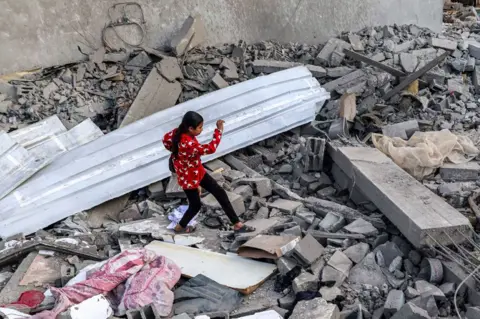 AFP
AFPColonel Joe Buccino, a former US army artilleryman who rose to become a senior official at Centcom, the US military command in the Middle East, points out that the Israeli military could “level” Rafah with the munitions it already has.
Washington supplies Israel with $3.8bn of military assistance a year. Congress recently added to that a further $17bn worth of weapons and defence systems - Israel is cumulatively the world’s largest ever recipient of US lethal aid.
Col Buccino says the paused shipment is “somewhat inconsequential” to any assault assault on Rafah.
“It's like a little bit of a political play for people in the United States who are… concerned about this,” he says.
Whether that is the case or not, it has not blunted the political fallout from Mr Biden’s move. In the halls of the US Senate, Republicans were seething.
“I think that pause is absolutely outrageous,” said US Senator Pete Ricketts, speaking to me outside a meeting of the Foreign Relations Committee. “The president really has no business doing this.”
When I put it to him that Israel still has the means to carry out its stated planned assault, he replied: “This is about supporting our ally Israel against a terrorist organisation.”
Another Republican Senator, John Barrasso, said that Israel had a right to “do what they want to do to protect their sovereignty”. For him Mr Biden’s move demonstrated one thing: “A weakness of this president.”
But within Mr Biden’s own party, there has been a warmer reception for the shift.
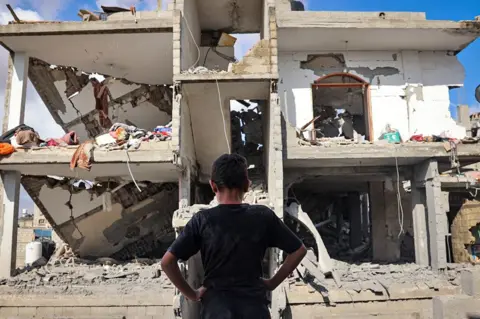 AFP
AFPDemocratic Senator Chris Coons two months ago called for restrictions on military assistance to Israel if it launched an assault into Rafah “at scale”, without significant changes in how Palestinian civilians were treated and protected.
“The conflict in Gaza… has led to a lot of painful reflection for many of us who count ourselves as strong supporters of Israel but are also very concerned about suffering and the humanitarian conditions,” he says.
He believes the president has tried “over and over” to restrain Mr Netanyahu but that tensions have grown because the Israeli leader relies on the political support of ultranationalists who oppose humanitarian aid going to Gaza and want to expel Palestinians from the West Bank.
“This may be the first real break,” says Mr Coons.
The “break” with Mr Netanyahu also comes at a critical moment in attempts to reach a ceasefire in exchange for the release of hostages held by Hamas. Talks in Cairo broke up earlier this week without apparent resolution.
Some Israeli commentators have suggested that Mr Biden’s move will compromise the hostage negotiations - that any attempt to blunt the threat of an Israeli assault on Rafah would benefit Hamas.
The running details of the talks are, however, mostly opaque, making it hard to definitively assess the claim. The biggest stumbling block is over Hamas’ demand for a permanent end to the war, which Israel rejects.
The relationship between Mr Biden and Mr Netanyahu goes back five decades, and has been turbulent for just as long.
When they were both young men, Mr Biden said he signed a picture which later sat on Mr Netanyahu’s desk, writing: “Bibi, I love you, but I don’t agree with a damn thing you have to say.”
Mr Netanyahu has often praised the president for his support of Israel, but they have fallen out frequently over major policy issues relating to the Palestinians.
Less than a fortnight after the October 7 attacks, Mr Biden flew to Israel and embraced Mr Netanyahu on the tarmac in Tel Aviv.
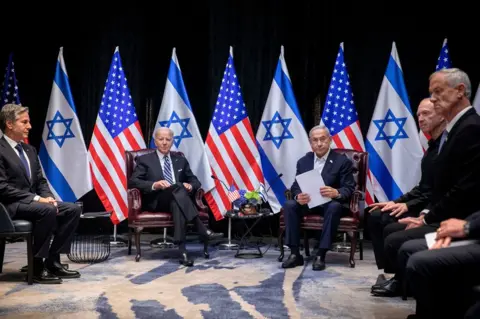 EPA
EPAI was there as Mr Biden emerged from a meeting with the Israeli leader and his war cabinet and stood at a podium to assert his unstinting support for Israel. But he had a warning: Don’t repeat the mistakes we made after the 9/11 attacks. And he spelled out what he meant: “The Palestinian people are suffering greatly as well, and we mourn the loss of innocent Palestinian lives like the entire world.”
Mr Biden’s wartime trip takes on further significance in hindsight: the start of an attempt to prevent a near unprecedented break in the US-Israel relationship, which inched closer this week.
On Thursday, the day after Mr Biden announced the weapons shipment pause, Mr Netanyahu fired back. The prime minister has long understood that he can rally his own base with shows of defiance to US pressure.
“If we need to stand alone, we will stand alone. I have said that if necessary we will fight with our fingernails,” he said.
I put Mr Netanyahu’s statement to Chris Coons, the Democratic senator.
“They don't need to fight with their fingernails,” he said. “They will and should fight with modern weapons systems that they have developed in many cases jointly with us, that are provided in many cases by us.”
“But they should do it in a way that minimises civilian casualties,” he said.

